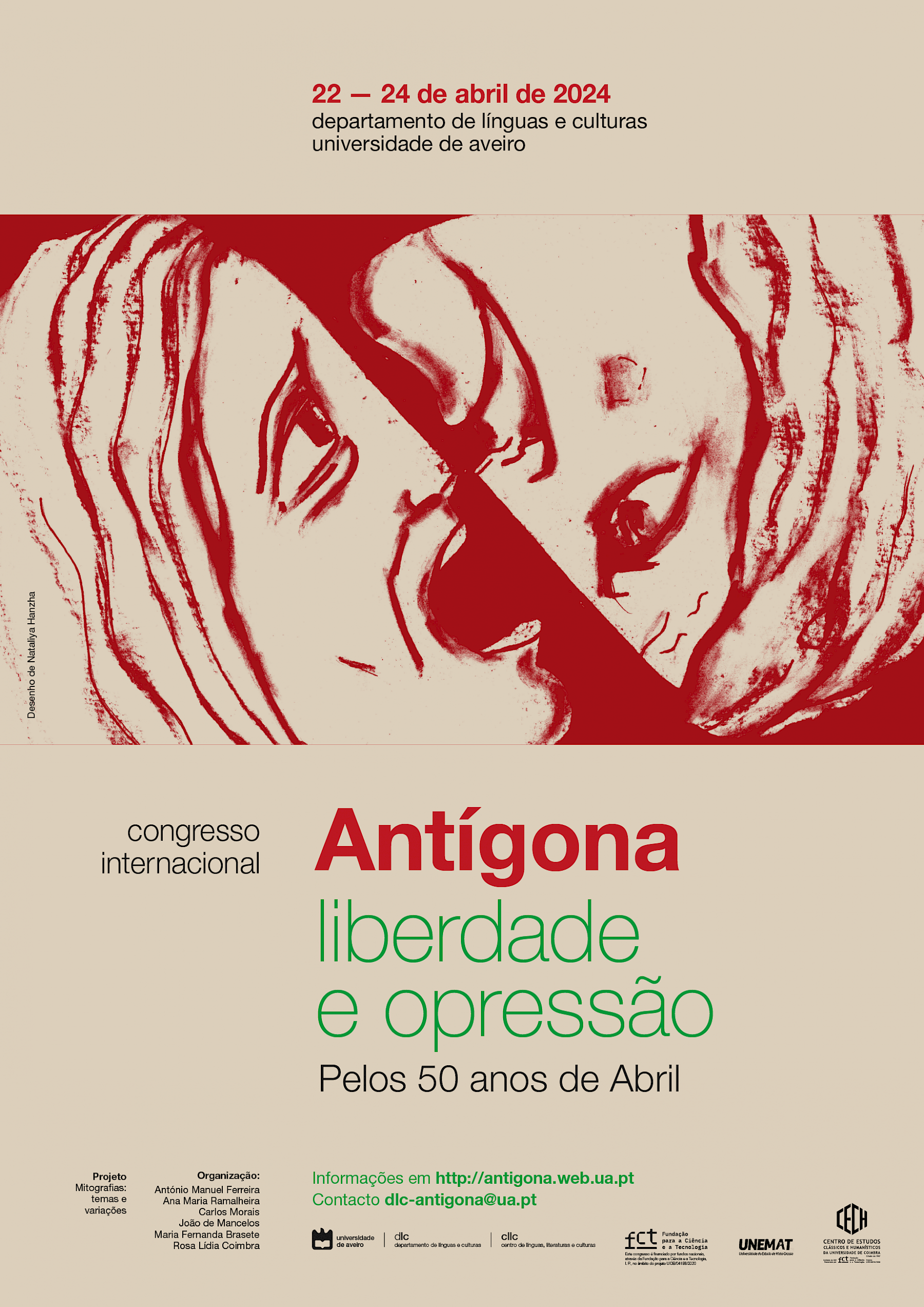22 to 24 April 2024
Tyranny, among many other privileges, enjoys that of doing and saying what it pleases. Sophocles, Antigone, vv. 506-507.
I wasn’t born to hate, but to love. Sophocles, Antigone, v. 524.
Antigone’s intrepid decision to undertake the task of burying her brother Polynices alone, thus breaking the edict that forbade funeral honours for this son of Oedipus, triggers an insoluble conflict with her uncle Creon, the new lord of the city of Thebes. Different and irreconcilable criteria of justice are at the origin of this conflict, which reaches its paroxysm in a long and tense agon (vv. 446-525), at the height of which the young daughter of Oedipus passionately asserts that “the [tyranny] between many other privileges, enjoys to do and say what it pleases” (vv. 506-507). To Creon’s particular written law, Antigone opposes, in defence of her fearless attitude, the unwritten natural law, which has always existed and that no one knows when it appeared. Even though it was prohibited by decree to pay funeral honours to Polyneices, it was fair to do so, because in the opinion of the fearless young woman – born to love and not to hate – this was a natural right. With this irreconcilable defiant action, which incessantly questions Creon’s coercive powers, Antigone becomes a paradigm of contestation to any and all exercise of absolute power and an example of a woman aware of her role in society, two mythemes that will be largely glossed over by western literature. Endowed with an inextinguishable capacity for reconfiguration, this myth was significantly chosen by the research group “Mythographies: themes and variations” to celebrate the 50th anniversary of the “carnation revolution” (April 25, 1974), which marked the end of a long period of oppression in Portugal and the consequent conquest of freedom. This event aims at keeping up with, reinforcing and enhancing research in multidisciplinary areas (literature, culture, linguistics and translation), and at interacting with other scientific, literary, artistic and cultural domains.
Thematic areas
We welcome proposals in the following thematic areas:
- The myth of Antigone and its reception;
- The figure of the dictator;
- The role of women in liberation struggles;
- The issue of justice;
- Arrogance and Rebellion;
- Mechanisms of repression and ideological control (censorship, political police…);
- The role of the press, literature and the arts in the fight against the dictatorship;
- Fratricidal wars;
- Memories of the colonial war in literature;
- The liberation movements.
SUBMISSION AND REGISTRATION, PUBLICATION
Important dates
- submission of abstracts: until 15 November 2023;
- notification to authors: until 15 December 2023;
- registration with a contribution: until 10 January 2024;
- registration without a contribution (limited): until 1 March 2024;
- conference: 22 to 24 April 2024;
- submission of the final text for publication: until 25 July 2024.
Submission of final texts
We accept proposals in an oral contribution format (maximum 20 minutes). Proposals must be sent to the dlc-antigona@ua.pt address, with the following information:
- name(s) of author(s);
- institution;
- title of paper;
- email(s);
- ORCID;
- complete address;
- abstract (up to 300 words);
- 6 keywords;
- CV (5 lines).
Contributions arising from academic theses in progress should include (upon authorization and collaboration) the supervisor(s) as coauthor(s). All abstracts will be subject to review by the Scientific Committee. Authors will be notified by e-mail. Languages: Portuguese, Spanish, French, English.
Registration
To validate your status as a speaker, you must register through dlc-antigona@ua.pt and attach the application form, and, if applicable, the proof of the bank transfer:
- Registration without a contribution – (limited): 25 € (until 1 March 2024).
- Registrations with an oral or poster contribution: 100 € (until 10 January 2024).
Information for payment of registration:
Beneficiary: Universidade de Aveiro IBAN: PT 50 0035 0836 0000 1785 2307 0 SWIFT Code / BIC: CGDIPTPL Código SWIFT / BIC: CGDIPTPL Bank: Caixa Geral de Depósitos Balcão da Universidade, 3810-193 AVEIRO Bank taxes are to be paid by the participant.
- Teachers and students of the University of Aveiro and CLLC members are exempt from registration payment. In such cases, in order to receive a participation certificate, a payment of 5 € must be made.
- Each contribution can only be presented by its author(s).
- Registration is required for participation in the conference, even for those who are exempted from paying.
Submission of final texts
The final texts of contributions for publication in the journal Forma Breve, will also be subject to a peer review process and must be sent, in a Word file, to dlc-antigona@ua.pt until the 25 July 2024, in accordance with the following stipulations:
- Formatting: 12 point Times New Roman, 1.5 line spacing;
- References, according to APA (see tutorial at <https://www.ua.pt/file/62638>);
- Header: title, name(s), institution(s), email;
- Abstract up to 300 words (Portuguese and English);
- 6 keywords (Portuguese and English);
- Page limit: 20.
- Authors must hold the copyrights of the images included in their articles.
Important dates:
- submission of abstracts: until 15 November 2023;
- notification to authors: until 15 December 2023;
- registration with a contribution: until 10 January 2024;
- registration without a contribution (limited): until 1 March 2024;
- conference: 22 to 24 April 2024;
- submission of the final text for publication: until 25 July 2024.

